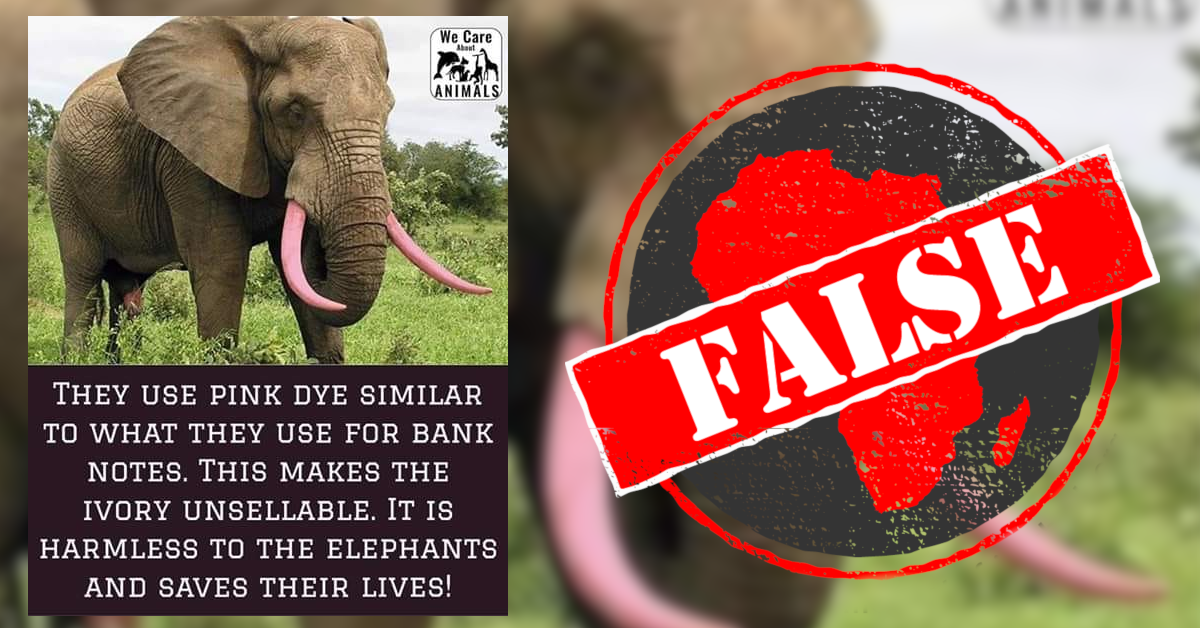A meme shared widely on Facebook in South Africa shows a large African elephant with pink tusks.
The text reads: “They use pink dye similar to what they use for bank notes. This makes the ivory unsellable. It is harmless to the elephants and saves their lives.” The meme has been online since at least 2015.
Every year, thousands of African elephants are killed for their tusks, which are cut off and sold as valuable ivory. Poaching is said by some to be in decline, but remains a problem. A 2019 study estimates there are 350,000 elephants left in Africa, but poachers kill 10,000 to 15,000 every year.
Does the meme show an elephant whose tusks have been dyed pink, to protect it from this slaughter?

A Tineye reverse image search reveals the photo of the elephant has been online since at least 2009. In the older versions of the photo, the animal’s tusks are not pink.
In the past 10 years it’s been widely used across the internet, including in a YouTube video. Again, the tusks are not pink.
The image in the meme has been manipulated to add the pink.
But do “they” commonly dye elephants’ tusks – which is “harmless” to the animals – to make the ivory “unsellable”, as the meme claims?
“Tusks grow back,” the International Fund for Animal Welfare (Ifaw) pointed out in 2017.
The Ifaw article, headlined “Why some creative poaching solutions fail”, was an answer to a frequent suggestion that elephant tusks be dyed to stop poachers killing the animals.
“Elephant’s tusks can grow as fast as an inch per year. The dye would grow out and re-dying each and every animal every few years is unrealistic,” Ifaw said.
“Capturing, sedating and dyeing the tusks of as many as 400,000 elephants is logistically impossible; the disruption and distress caused to these elephants could be detrimental to individuals and families; the number of elephants killed in the process would likely be sizeable; and the process would have to be repeated every few years or so.”
And as Ifaw pointed out in an earlier article: “Even if it was possible, there is no guarantee that pink ivory would not become the next popular commodity.”
The meme’s image has been manipulated, and its claim is incorrect. – Eileen Jahn
The text reads: “They use pink dye similar to what they use for bank notes. This makes the ivory unsellable. It is harmless to the elephants and saves their lives.” The meme has been online since at least 2015.
Every year, thousands of African elephants are killed for their tusks, which are cut off and sold as valuable ivory. Poaching is said by some to be in decline, but remains a problem. A 2019 study estimates there are 350,000 elephants left in Africa, but poachers kill 10,000 to 15,000 every year.
Does the meme show an elephant whose tusks have been dyed pink, to protect it from this slaughter?

Image of elephant manipulated
A Tineye reverse image search reveals the photo of the elephant has been online since at least 2009. In the older versions of the photo, the animal’s tusks are not pink.
In the past 10 years it’s been widely used across the internet, including in a YouTube video. Again, the tusks are not pink.
The image in the meme has been manipulated to add the pink.
‘Number of elephants would be killed’
But do “they” commonly dye elephants’ tusks – which is “harmless” to the animals – to make the ivory “unsellable”, as the meme claims?
“Tusks grow back,” the International Fund for Animal Welfare (Ifaw) pointed out in 2017.
The Ifaw article, headlined “Why some creative poaching solutions fail”, was an answer to a frequent suggestion that elephant tusks be dyed to stop poachers killing the animals.
“Elephant’s tusks can grow as fast as an inch per year. The dye would grow out and re-dying each and every animal every few years is unrealistic,” Ifaw said.
“Capturing, sedating and dyeing the tusks of as many as 400,000 elephants is logistically impossible; the disruption and distress caused to these elephants could be detrimental to individuals and families; the number of elephants killed in the process would likely be sizeable; and the process would have to be repeated every few years or so.”
And as Ifaw pointed out in an earlier article: “Even if it was possible, there is no guarantee that pink ivory would not become the next popular commodity.”
The meme’s image has been manipulated, and its claim is incorrect. – Eileen Jahn
Republish our content for free
For publishers: what to do if your post is rated false
A fact-checker has rated your Facebook or Instagram post as “false”, “altered”, “partly false” or “missing context”. This could have serious consequences. What do you do?
Click on our guide for the steps you should follow.
Publishers guideAfrica Check teams up with Facebook
Africa Check is a partner in Meta's third-party fact-checking programme to help stop the spread of false information on social media.
The content we rate as “false” will be downgraded on Facebook and Instagram. This means fewer people will see it.
You can also help identify false information on Facebook. This guide explains how.


Add new comment